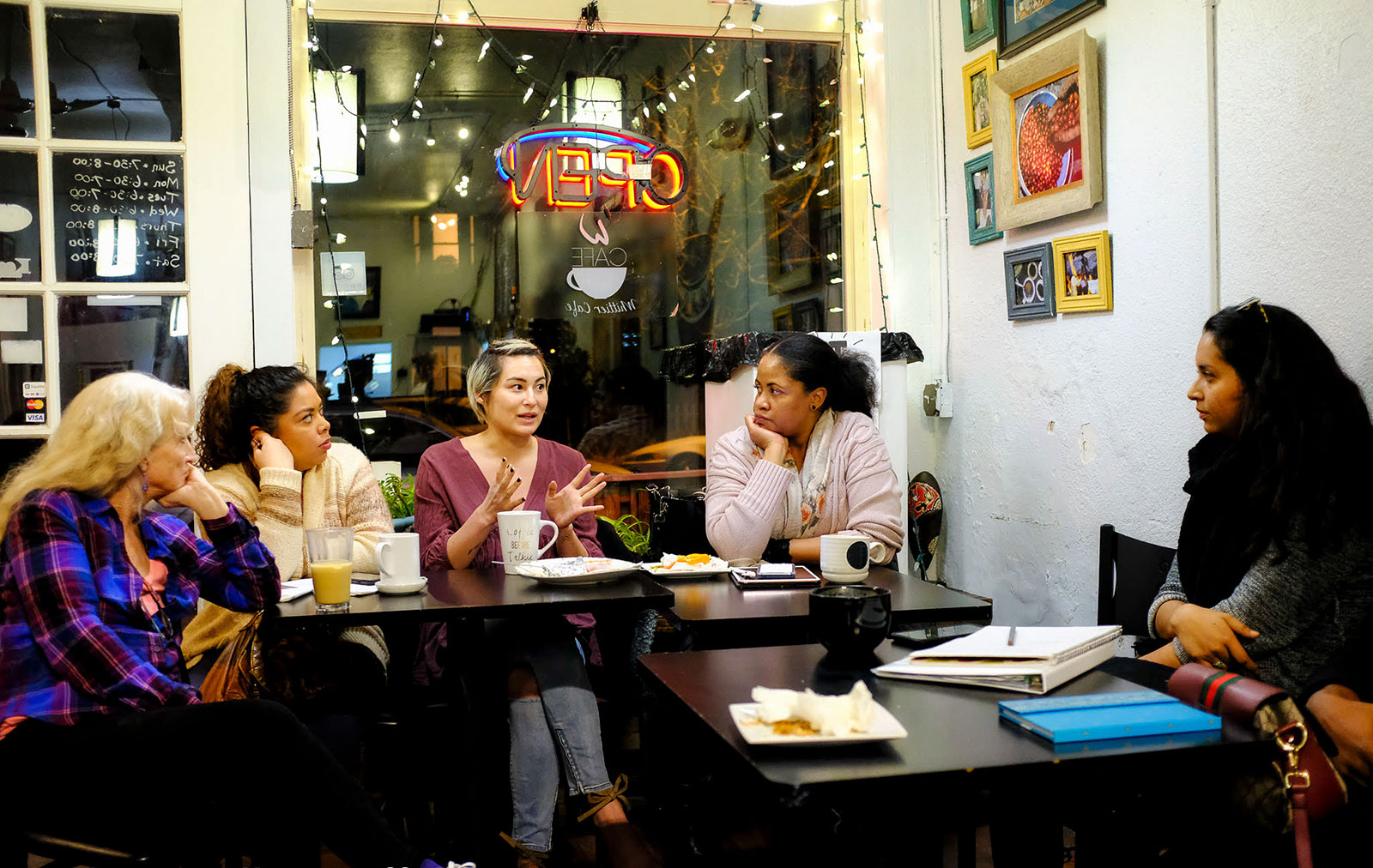The Local newsletter is your free, daily guide to life in Colorado. For locals, by locals.
From leading a more inclusive Womxn’s March to launching a new fight for equal pay, Colorado women are mobilizing in 2019 to make room at the table for more diverse voices—and amplify their volume.
With an eye on increasing voter engagement in 2020, the Denver Womxn’s March, planned for Saturday, January 19, features a heightened focus on diversity and intersectionality. Although historic numbers of Colorado women and minorities won elected offices in 2018, women of color still face significant disparities across the state.

The 2019 theme, “Listen. Unite. Act.”, is a guiding light for the Womxn’s March as it enters its third year, says Angela Astle, one of the organization’s four executive leaders and the founder of the Athena Project, a local nonprofit dedicated to empowering women and girls to become leaders in the arts. “We need to listen to those who have been silenced, unite under the banner of anti-oppression, and act with intention,” she says.
Criticized in past years for focusing too narrowly on the voices of white women, the broader Women’s March movement faces new challenges this year, including the cancellation (and relaunching) of regional events and charges of antisemitism within the national organization.
In Colorado, Womxn’s March organizers addressed diversity concerns by creating a new leadership team composed primarily of women of color, reaching out to underrepresented communities for input, and adding an “x” to the group’s name to be more inclusive of people with different gender identities.
Leaders also organized a series of community forums in the months leading up to the march and created an open call for submissions for speakers and artists, rather than relying on organizers to make nominations, says executive leader Brenda Herrera Moreno. “What has been formed in the past two years is incredible community engagement,” she says. “For our upcoming year, we’re looking at how can we engage with everyone who needs to be represented.”
Fellow Womxn’s March executive leader and anti-oppression trainer Regan Byrd said the March’s focus on intersectionality refers to the combined impact of racism, sexism, and other types of oppression that impact individuals with multiple social identities. “It’s about not looking at racism and sexism as siloed issues, but about recognizing that they intersect and overlap in individuals,” she says.
Intersectionality also has a strong economic impact: While the gender wage gap narrowed slightly for white women in Colorado between 2015 and 2018, the wage gap actually widened for Hispanic, black, and multiracial women, according to the Women’s Foundation of Colorado (WFC). While Colorado women overall earn 86 cents for every dollar earned by a white man, a more detailed view of the data shows that black women earn just 63 cents, Native American women earn 56 cents, and Hispanic women earn 54 cents for every dollar earned by a white man.
“This is a really complex issue, but we know what’s at play here is gender bias and racism,” says Louise Myrland, vice president of programs for the WFC. “Intersections of identity mean that the opportunities for women of color to advance their earning potential really are more limited.”
One way to address the intersectionality Womxn’s March leaders are highlighting is through equal pay legislation that can help close the earnings gap for women of color, says Myrland. Colorado Sen. Jessie Danielson (D-Jefferson County) introduced the Equal Pay for Equal Work Act on Thursday, which enables workers to advocate for their own advancement. A key provision in the bill, which could help level the playing field for women of color, prohibits employers from asking about salary histories, so future earnings aren’t based on past disparities. “This bill really is a path forward for meaningful change and an effort to close the wage gap,” Danielson says.
When it comes to creating more pieces of legislation like this, both Danielson and Myrland point out that representation matters. To engage more underrepresented voters, and help elect more women in 2020, Womxn’s March organizers plan to continue conversations about diversity and intersectionality long after the event with additional community forums.
“We’re trying to frame this March as a launching pad for increased activism and awareness,” says Byrd. “We want to invite everyone who cares about these issues to come together and have conversations with each other, listen to those who have been marginalized or targeted by oppression, and start building something.”
Byrd also advocates for allyship (another key theme of the March) from those who don’t experience intersectionality but want to support those who do. Good intentions aren’t enough to be a good ally, she explains. “The way in which you have to tackle issues like income inequality and the intersections of racism and sexism is to be explicitly anti-racist and anti-sexist,” she says.
Astle, who is white, says the greatest lessons she’s learned as an ally are to listen and not get defensive. “I don’t want to contribute to excuses. I want to contribute to action,” she says.
By creating a more unified—and representative—women’s movement, March organizers hope to have an even stronger voice in 2020. “There’s a lot of power when we come together and there’s a lot of energy when we align ourselves in the same direction,” says Herrera Moreno. “We’re hoping to keep that energy going.”
If you go
When: Saturday, January 19; the pre-rally starts at 9 a.m., the march begins at 10:30 a.m., and the post-rally is scheduled for 11:45 a.m.
Where: Denver’s Civic Center Park, 1451 Bannock St.
Details: For safety tips, what to bring, and more information, visit the event’s website.








